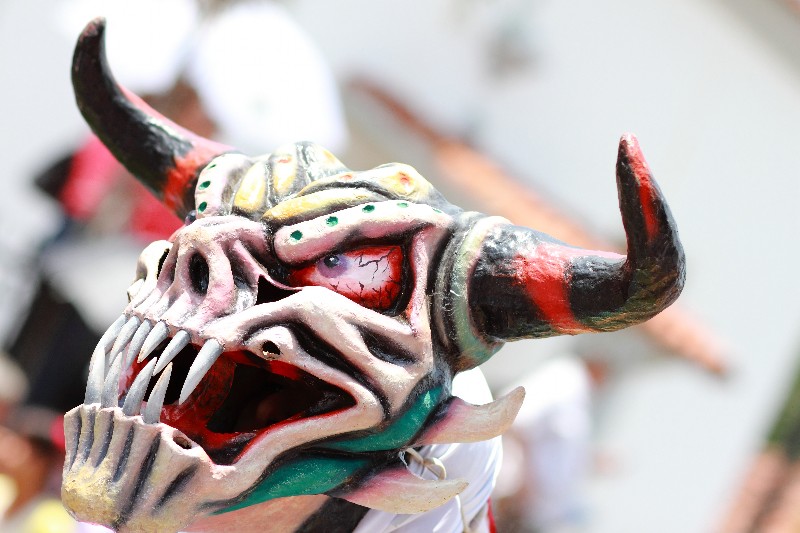Corpus Christi Festival: An Oral History told by Devil Dancers

If you are interested in immersing yourself in some of Panama’s best folklore, Los Santos on the Azuero Peninsula is a great place to start. Each year in June, masked devils draped in elaborate colorful costumes parade through the streets. The town is celebrating the Corpus Christi festival. Traditional stories and dances, each with their own legacy are performed in the streets and parks. Yesterday, June 19 the Los Santos community once again came together to observe this Corpus Christi and keep their folklore alive. Corpus Christi is the celebration of the Holy Communion in the Roman Catholic Faith. The tradition brought to Panama in the Spanish Colonial era, has since been transformed from a customary procession into an elaborate performance. Today the celebrations blend both religious ritual with traditional mythology in a festival loved by both locals and tourists.
In 1998 Artistdes Burgos, president of the Miguel Leguizamo Association for Dance Revival, expressed his association’s desire to recover national patrimony in the area of Los Santos. Burgos spoke to a need to reinvigorate Panamanian folklore to attract youth to continue the tradition. In and effort to do so Burgos sought to bring the Corpus Christi dances to the schools where the dances and stories behind them could be shared with the next generation.
With determination to preserve and share the traditional dances, music and stories, Panama’s Tourism agency also took an interest in promoting the festival nationally. “We are going promote Corpus Christi in Panama’s hotels so that more tourists can enjoy the show and learn more about our traditions,” said Perez Balladares, assistant director of the Panamanian Institute of Tourism (IPAT).
Together Burgos and Panama’s Tourism Agency have designated the main Corpus Christi procession, a ‘Tourist Day.’
Although, Corpus Christi is a two-week long celebration, the main procession always takes place sixty days after Palm Sunday, this year that is June 19. The largest festivals will take place in Los Santos and Chitre, but each year devil dancers also take to the streets of La Chorrera.
In each town the procession will be similar. The day begins early, as the crowd searches the town for El Torito (little bull) a scary little figure that hides among the town’s streets and houses. Drummers and pipers lead the procession to the town center where the show begins. It is here townspeople come together to play the diablicos limpios y sucios (dirty and clean devils). Nobody gets paid for their performance. Despite this, the citizens of the town continue to work together to put on the annual show.
The first dance, the dance of the dirty devils, has no dialogue. It is a series of leaps and hops and the occasional chasing of a spectator. The dance represents the Roman Catholic Church scaring non-Catholics into conformity. While no words are spoken, it is part of an oral history that has been passed down through generations.
After several other traditional dances take place, the clean devils confront the dirty devils. In Los Santos, this final dance takes place in the park outside the eighteenth century San Atanasio Church. It is here the clean devils defeat the Grand Diabolico (the great devil), leader of the dirty devils, in a choreographed dance accompanied by dialogue. A party through the streets follows this final dance, and Corpus Christi is in full swing.
The village of Los Santos is approximately a 3-hour drive from the Coronado area. If you are planning on visiting during the festival it is a good idea to book a hotel ahead of time.
